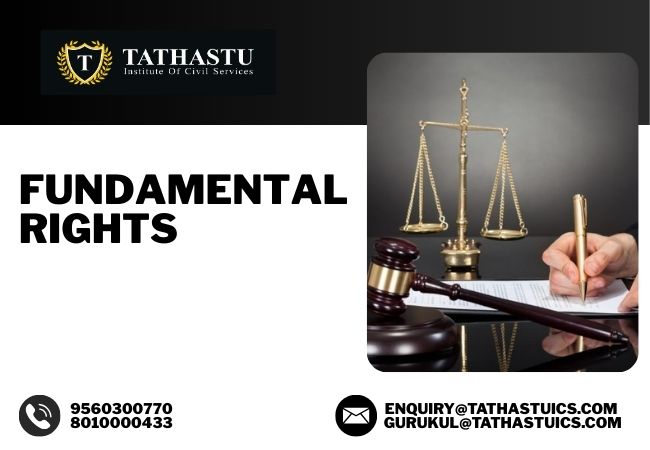What are Fundamental Rights?
- All people who are citizens of India have their basic freedoms secured through the Fundamental Rights provisions within the Constitution of India.
- The fundamental rights of citizens exist in Part III (Articles 12 to 35) of the Indian Constitution as they function to protect individual liberty and dignity alongside achieving equality.
Fundamental Rights under Indian Constitution
- The six fundamental rights, mentioned in Articles 12 to 35 (Part III) of the Indian Constitution, are as follows:
- Right to Equality (Articles 14 – 18)
- Right to Freedom (Articles 19 – 22)
- Right against Exploitation (Articles 23 – 24)
- Right to Freedom of Religion (Articles 25 – 28)
- Cultural and Educational Rights (Articles 29 – 30)
- Right to Constitutional Remedies (Article 32)
| Note: Originally, the Indian Constitution granted seven Fundamental Rights, including the six currently recognized rights and the Right to Property. However, the 44th Amendment Act of 1978 removed the Right to Property from the list of Fundamental Rights. Instead, it was reclassified as a legal right under Article 300-A in Part XII of the Constitution.
As a result, India now has only six Fundamental Rights. |
Definition of State (Article 12)
- Article 12 defines the term ‘State’ for Part III. Accordingly, the State includes the following:
- The Government and Parliament of India, that is, the executive and legislative organs of the Union government,
- The Government and Legislature of States, that is, the executive and legislative organs of the State government,
- All local authorities, that is, municipalities, panchayats, district boards, improvement trusts, etc.
- All other authorities, that is, statutory or non-statutory authorities like LIC, ONGC, SAIL, etc.
Laws inconsistent with or in derogation of the Fundamental Rights (Article 13)
- The provisions under Article 13 state that every law contradicting Fundamental Rights shall become null and void. Article 13 includes a specific clause that allows the concept of judicial review.
- Article 32 enables the Supreme Court to exercise Judicial Review.
- Article 226 provides High Courts with the power of Judicial Review.
| Note: A Constitutional Amendment Law can also be challenged in the Court for violating the Fundamental Rights (Kesavananda Bharati case 1973). |
Right to Equality (Article 14 to Article 18)
- These provisions ensure that all individuals are treated equally before the law, prohibiting discrimination on grounds of religion, race, caste, sex, or place of birth.
- They also abolish untouchability and titles, reinforcing social justice and equal opportunities.
- These constitutional provisions establish legal equality through nondiscriminatory treatment regardless of religion and race as well as caste or sex and birthplace recognition.
- Title and untouchability bans promote social equality along with opportunities for all people.
Right to Freedom (Article 19 to Article 22)
- This right guarantees various fundamental freedoms such as speech and expression, assembly, association, movement, residence, and profession (Article 19).
- It also includes protection in cases of arbitrary arrest (Article 22) and safeguards against personal liberty violations.
Right Against Exploitation (Article 23 to Article 24)
- These provisions prohibit human trafficking, forced labor, and begar (Article 23) while banning the employment of children below 14 years in hazardous industries (Article 24).
- They aim to protect the dignity and rights of vulnerable sections of society.
Right to Freedom of Religion (Article 25 to Article 28)
- This guarantees every individual the freedom to practice, profess, and propagate their religion (Article 25).
- It also ensures that religious institutions can manage their affairs and that the state remains neutral, treating all religions equally.
Cultural and Educational Rights (Article 29 to Article 30)
- These provisions protect the rights of minorities to preserve their distinct language, script, and culture (Article 29).
- They also grant minorities the right to establish and administer educational institutions of their choice (Article 30).
Right to Constitutional Remedies (Article 32)
- Article 32 empowers individuals to directly approach the Supreme Court if their Fundamental Rights are violated.
- Dr. B.R. Ambedkar called it the “heart and soul” of the Constitution, as it ensures the enforcement of rights through writs like habeas corpus, mandamus, prohibition, certiorari, and quo warranto.
Armed Forces (Article 33)
- This provision empowers Parliament to enact laws that restrict or modify the application of certain fundamental rights for members of the armed forces, police forces, intelligence agencies, or similar forces tasked with the maintenance of public order.
- The objective of this provision is to ensure the proper discharge of their duties in the interest of national security and the maintenance of discipline among them.
Martial Law (Article 34)
- This provision provides for restrictions on fundamental rights during the operation of martial law in any area within the territory of India.
- However, the expression ‘martial law’ has not been defined anywhere in the Constitution.
Legislation to give effect to the provisions of this part (Article 35)
- This provision specifies that Parliament alone has the authority to enact laws aimed at implementing certain fundamental rights.
- This ensures uniformity across India concerning the nature of these rights and penalties for their violation.
Conclusion
Fundamental Rights form the cornerstone of the Indian Constitution, ensuring individual freedoms, social justice, and equality for all citizens. They not only safeguard people against state arbitrariness but also empower them to live with dignity and autonomy. While these rights are subject to reasonable restrictions to maintain public order and national security, their enforcement through judicial remedies strengthens democracy.

